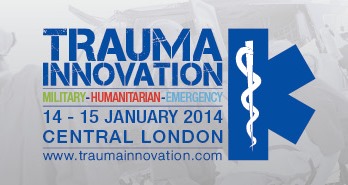Latest News

15th Jan 2014
Lessons learned from treating trauma casualties in Iraq & Afghanistan
 The Trauma Innovation conference is under way in London and on day 1 we attended a workshop on lessons learned from treating trauma casualties in Iraq and Afghanistan and how to make sure those lessons will not be lost. The panel were concerned that as budgets are tightened after drawdown, some of the expertise and methods learned will inevitably be lost. Brigadier Gamble from the US painted a clear picture of this danger. On a more positive side, there was a significant list of improvements, including: Damage Control techniques from resuscitation to the operating theatre, the data collection in the JTTR, Aeromed evacuation techniques, re-learning tourniquet use and (of course) development of haemostatic agents such as Celox.
The Trauma Innovation conference is under way in London and on day 1 we attended a workshop on lessons learned from treating trauma casualties in Iraq and Afghanistan and how to make sure those lessons will not be lost. The panel were concerned that as budgets are tightened after drawdown, some of the expertise and methods learned will inevitably be lost. Brigadier Gamble from the US painted a clear picture of this danger. On a more positive side, there was a significant list of improvements, including: Damage Control techniques from resuscitation to the operating theatre, the data collection in the JTTR, Aeromed evacuation techniques, re-learning tourniquet use and (of course) development of haemostatic agents such as Celox.
Dr Veen made the point from his experience of working in multiple trouble spots (with ICRC and others) that it is inevitable that the lessons of working in a conflict area need re-learning every time. Colonel Kerr, from the perspective of the smaller military medical resource saw increasing international collaboration as a way forward. From the audience there was a feeling that great steps have been made but they could easily be lost in the busy civilian world in areas where major trauma cases thankfully happen much less often. Sending teams on humanitarian missions was discussed but the point was made that if this is done inappropriately, when the mission leaves is can cause more harm because during the crisis, the incoming teams may have inadvertently but nonetheless effectively dismantled whatever local medical provision was in place.
So it is not easy to keep the lessons learned alive, but it seems that with the data source of the JTTR there is an opportunity to keep researching the database of knowledge and with modern learning techniques from simulated trauma mannequins to video linkups there are more ways to get the knowledge passed on where and when it is needed. There is a real sense of determination that budget restrictions must not lead to knowledge lost.
